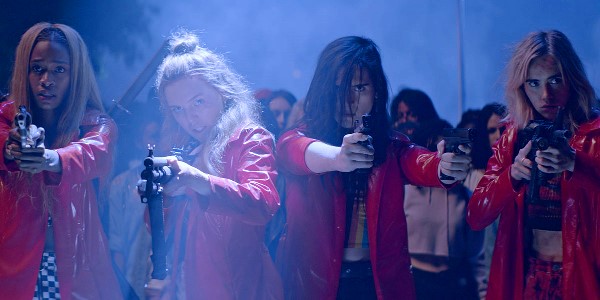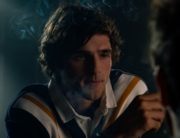Since 2015, I’ve been asking myself two questions: Who came first, millennials or Judd Apatow? And do millennials, Internet culture, and Judd Apatow feed each other mutually? The reader might get where I’m coming from as I try to trace the very thin line of where it all went wrong, how the current toxic political/social climate came into being.
Assassination Nation strives to make a bit more sense of that line, and boy, does it succeed. By doing so, it even raises more questions, with a sarcastic and raw tone. The dark, bloody, and raunchy comedy/thriller depicts how the quiet American town of Salem, named after the site of the original witch hunt, suddenly erupts into chaos after a data hack exposes the secrets of its inhabitants’ personal lives—including the mayor’s—and four mischievous and popular high school girls are left to take the blame. (There is an opening viewing advisory, warning of “drug use, sexual content, toxic masculinity, homophobia, transphobia, guns, nationalism, racism, kidnapping, the male gaze, sexism, swearing, torture, violence, gore, weapons and fragile male egos.”)
Director and writer Sam Levinson takes no prisoners. His social commentary paints a picture of what we’re witnessing in the second decade of the 21st century: a nation that has been overtaken by ridiculous Internet immature frat boys, or “bros,” who provoke with pranks; with goofiness as the norm; a workforce culture based on leisure “memes;” and, scariest of all, a paranoid, pessimistic, and mean-spirited environment where putting individuals down with words like “asshole” is a normal everyday conversation. (Admiring a woman’s physical beauty is now labeled “eye fucking,” as one of the four main characters crudely states.) In a world gone mad, parents may also be blamed for their blatant disregard toward their children’s behavior. Again, we may ask ourselves, where did this mess begin?
At first the movie’s tone is all over the place, which may also be a subtle criticism of the attention deficit of today’s viewers, but the movie slowly descends into a very aware and stimulating intense piece that knows exactly what it wants to be and what messages it wants to convey: Where do you stand as a generation, when you’re even worse than those you’re exposing on social media? “You ruined that person’s life” says a police officer to one of the teens, an accusation used by Levinson to express a compassionate and conscious cry. (“God, I hate the F****** Internet” expresses a detective, in another venting out moment.) This film feels like it was written from the heart.
Irony is apparent when you see Maude Apatow, Judd’s oldest daughter, in a minor but effective role. Why cast the daughter of one of this generation’s influences, in a movie that openly criticizes this extreme and hostile culture? A tongue-in-cheek gag, perhaps? Or just for the lulz?







Leave A Comment